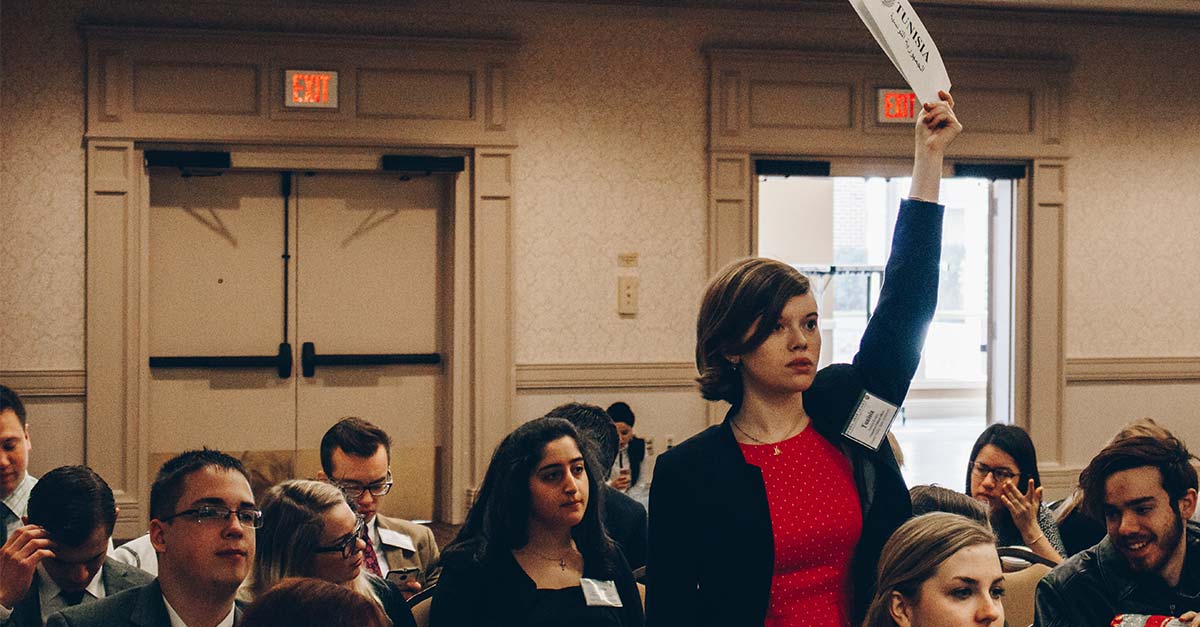2024-2025 Provisional Agenda (PDF)
PLEASE NOTE: Not all Models will have all Councils. Please look at your specific Conference Page or contact the Local Coordinator or the National Council Student Programs Coordinator for your model to find out which Councils will be represented.
Joint Defense Council
- Defining objectives for enhancing the Arab League’s modernization efforts, with a specific focus on addressing the requirements of remote warfare.
- Analyzing measures to develop counterterrorist operations within the region, particularly in territories with high-density populations.
- Developing preventative frameworks for conflict and reconstruction monitoring within the League to prevent internal conflicts and regional disputes.
- Coordinating security and access for Non-Governmental Organizations, Aid Organizations, and relief workers in conflict zones.
Council on Palestinian Affairs
- Developing a plan for the protection of Palestinians’ right to identity through the preservation and celebration of cultural heritage.
- Addressing challenges to sustainable development in Palestinian society to allow future progress.
- Ensuring the protection and dignity of refugees in the West Bank from outside forces.
- Facilitating relations between Palestine and the International Community, focusing on international organizations.
Council on Political Affairs
- Exploring space diplomacy as a possible opportunity for both inter-League and foreign partnerships.
- Assessing and increasing election accessibility for youth and vulnerable citizens.
- Creating a League-wide policy to combat the usage of AI to spread disinformation and propaganda.
- Formulating strategies to build trust coalitions and open dialogues between the Arab League’s member nations.
Council of Arab Social Affairs Ministers
- Examining the impact that conflict has on women’s access to medical care and menstrual health products, focusing on Internally Displaced People and refugees.
- Identifying and mitigating youth radicalization and extremism through League-wide efforts, and establishing social tactics to prevent or counter them.
- Exploring methods to promote cultural events, celebrations, and outreach to increase interest in Arab countries and culture both internationally and within the Arab League.
- Discussing ways to enhance and promote interfaith dialogue within the Arab League and in member states.
Council of Arab Environmental Affairs Ministers
- Combating wildlife trafficking and poaching to protect species populations and biodiversity.
- Examining eco-friendly infrastructure development methods to decrease the strain on limited natural resources and encourage sustainable building practices.
- Developing gender-sensitive policies and programs necessary to alleviate food and water insecurity for women in the MENA region.
- Addressing transboundary pollution within the MENA region, including but not limited to air and water pollution.
Council of Arab Economic Affairs Ministers
- Assessing the impact of higher education on economic growth and creating methods for increasing educational and economic opportunities to avoid “Brain Drain” throughout the League.
- Exploring the use of clean energy for reliable job creation and addressing issues of League-wide energy poverty and electricity access.
- Examining the impact that Supply Chain Blockages have on the Economic Stability of Arab States
- Discussing the potential impact of global sanctions against non-member states on the Arab League.
Summit of Arab Heads of State
- Assessing the impact of outside and non-state actors on the Arab League’s stability and sovereignty to prevent outside interference in League policy.
- Addressing how the League should act in response to human rights violations from one of its member states.
- Reassessing current Arab League treaties and agreements and whether they should be updated to match the changing world.
- Evaluating the Casablanca Protocol, formally the “Protocol for the Treatment of Palestinians in Arab States,” and discussing expanding the existing League-wide agreement.
Special Council on Technology and Development
- Promoting the development of agrarian technology to increase food production in the MENA region.
- Exploring ways to create or expand public transportation infrastructure within the Arab League.
- Discovering methods of utilizing Artificial Intelligence to address issues in key areas of development.
- Devising strategies to expand and/or implement broadband infrastructure in member states.
Arab Court of Justice
- The League of Arab States (represented by Lebanon) vs. Tunisia: Regarding the Tunisian authorities’ alleged treatment of Sub-Saharan African migrants and refugees.
- The European Parliament (represented by Oman) vs. Qatar: Regarding claims of corruption against the Qatari government
- Sudan vs. The United Arab Emirates: Regarding the UAE’s interference and exacerbation of the Sudanese Civil War.
- Somalia vs. Ethiopia (represented by Djibouti): Regarding Ethiopia’s Memorandum of Understanding signed between itself and Somaliland.
- The League of Arab States (represented by Jordan) vs. Saudi Arabia: Regarding human trafficking in Saudi Arabia

